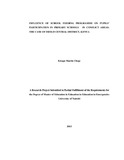| dc.description.abstract | The proponents of school feeding programme claim that providing food in schools would ostensibly attract vulnerable children to school, improves their attendance and minimizes drop-outs. According to the United Nations World Food Programme, School Feeding Programme is an incentive for vulnerable families to invest in children’s education and encourages poor households to send children to school and helps to keep them there. The purpose of this study was to determine the influence of school feeding programme on pupils’ participation in conflict prone with major focus on Isiolo Central District. Five research questions were formulated to guide the study. The study used descriptive survey design. The target population for the study included all the 30 head teachers, 479 teachers and
22,534 pupils in Isiolo Central district. The sample consisted of 18 head teachers,
54 teachers and 396 pupils. The questionnaires were used to collect data from the head teachers, teachers and pupils. Data was analysed both qualitatively and quantitatively.
The study established that school feeding program influenced the enrolment of pupils in primary school in Isiolo Central District. The study also established that the school feeding programme influenced the attendance of pupils in schools in Isiolo Central District. The study established that with the introduction of SFP, the participation of the pupils in class has been described as lively. The SFP also influenced the dropout rate of the pupils in Isiolo Central District as hunger was number one reason for dropout. Among the challenged which faced the implementation was insecurity, theft, lack of water and other essentials such as fuel and manpower. The study therefore concluded that school feeding program influenced the enrolment of pupils in primary school; the school feeding programme has influenced the attendance of pupils in schools; the introduction of SFP enhanced active participation of the pupils in class as it has made the pupils to be lively in class; SFP also influenced the dropout rate of the pupils in Isiolo Central District as hunger was number one reason for dropout and among the challenges facing the implementation of SFP was insecurity, theft, lack of water and other essentials such as fuel and manpower. The study recommended that the government should increase the coverage of the areas under school feeding programme especially the regions hard hit with conflict with the view to improving the enrolment rates; the government should ensure there is a constant supply of school meal so as to maintain the pupils attend school regularly; the government and the donors should ensure the school meal has the right nutrients so as to keep the children alert in class to actively participate in the learning process and the government should ensure that all the schools in the conflict regions have SFP so that hunger does not force any child to drop out of school. | en |

